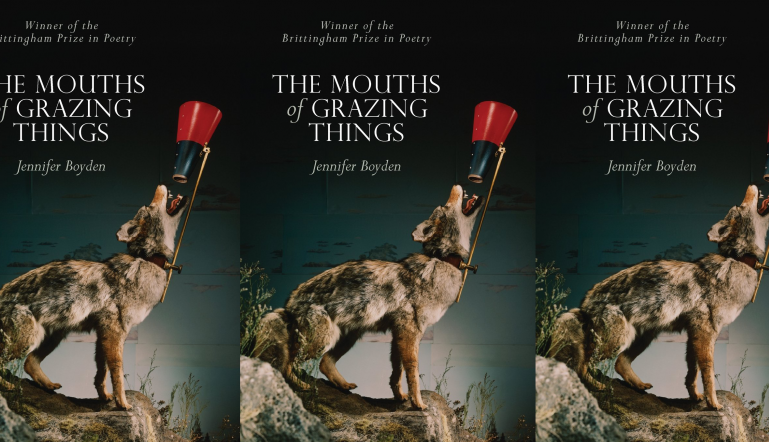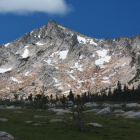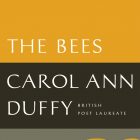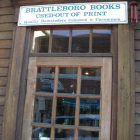Interview with Jennifer Boyden
 Before I even begin talking about Jennifer Boyden I have to hold myself back a little, and that’s because I happened to travel to New York in the summer of 2002, and I happened to bring with me a copy of a lit journal, and in that journal was a poem by Jennifer Boyden which I for a longish while (like two years) had memorized, and I got in touch with Ms. Boyden, and she was the first writer who ever offered to show me her unpublished manuscript, which she sent me in maybe the summer of ’04, which I quickly devoured, and then, because of other obligations and time, we stopped talking as much. I ate her work and words over and over for years, and hoped I wasn’t the only one with a taste for them or who was that hungry. And then the universe, in the form of the University of Wisconsin, said yes to Jennifer Boyden, and her The Mouths of Grazing Things won the Brittingham Prize and good lord, this is that book: this is that debut book close readers hope for, one in which the language is both powerful and delicate, like a knife made of feathers or bird’s wing bone made of stone. It’s a monumentally gorgeous book. It’s one to read, reread, and pass around. It’s a book to, like a door, knock on and ask questions of, and see how it’ll open up to you. And Jennifer Boyden also happens to be a fantastic, great person, and answered a bunch of nosy questions, the results of which are below:
Before I even begin talking about Jennifer Boyden I have to hold myself back a little, and that’s because I happened to travel to New York in the summer of 2002, and I happened to bring with me a copy of a lit journal, and in that journal was a poem by Jennifer Boyden which I for a longish while (like two years) had memorized, and I got in touch with Ms. Boyden, and she was the first writer who ever offered to show me her unpublished manuscript, which she sent me in maybe the summer of ’04, which I quickly devoured, and then, because of other obligations and time, we stopped talking as much. I ate her work and words over and over for years, and hoped I wasn’t the only one with a taste for them or who was that hungry. And then the universe, in the form of the University of Wisconsin, said yes to Jennifer Boyden, and her The Mouths of Grazing Things won the Brittingham Prize and good lord, this is that book: this is that debut book close readers hope for, one in which the language is both powerful and delicate, like a knife made of feathers or bird’s wing bone made of stone. It’s a monumentally gorgeous book. It’s one to read, reread, and pass around. It’s a book to, like a door, knock on and ask questions of, and see how it’ll open up to you. And Jennifer Boyden also happens to be a fantastic, great person, and answered a bunch of nosy questions, the results of which are below:
Cutter: If you were writing in another genre, who’d you like to write like and why? Or, maybe because I know your latest project: what the hell’s the novel’s fire or start and/or why?
Boyden: I wrote a novel this summer. It got kicked off because several of the things I have been thinking about lately started connecting, and characters began accreting to those connections and then moving off in their own directions, leaving trails.
This novel is the result of fascination with a lot of things—here is the short list: neurodevelopment; the inner lives of organisms that do not inhabit time the way animals do; the arbitrary use of minor power which is comical right up until whatever tragedy it creates; the “failure to launch” phenomenon in which boys feel disenfranchised and give up just as they should be hitting their stride; Zen; the way emotions influence both physical and perceptual realities; the physical well being of the earth; and the brain’s ability to delude the self into believing that everything is just as we want it to be. But these were all just interests of mine, things I read about because I think they are fascinating. But then I suddenly found myself at the mercy of someone else’s ridiculous moment of power which happened at exactly the same time as the gut ripping horror of the BP oil spill—and then there was that wonderful snap where all of those interests had a context and a texture and a story. So I guess I need to be grateful for a staggering anger and feeling of helplessness.
I think, in the end, the novel’s sparks were all of the things I love to think about anyway, then the fuel was the BP fiasco, and the sustained burn were the characters I began to love. As for other genres, I am working on finishing a book of walking essays, and someday when I figure out how to orchestrate chaos, I would like to be involved in public performance art for hire that specializes in showing up at the headquarters of corporations in need of greater public accountability.
Cutter: And okay, fine, the poetry question: what’s the first sexy or suckering phrase you read which made you point at the page (or whatever) and deep breathe-in and go, shit, that’s what I want to do? And, if you can: what was it about that line?
Boyden: When I was a teenager I passed a bookstore in Washington, DC and stopped hard for a photography book of Constantin Brancusi’s sculptures. Endless Column, Sleeping Muse, Bid in Space. I was helpless in the presence of this stuff. I know you’re asking about poems, but this was the first time I was aware of experiencing the pleasure of materiality and form, a convergence that felt authentic and encompassing for how it recognized the maker, the materials, and the culmination of having been located in precise times and places and experiences. I bought the book with all of the travel money I had—my first book purchase ever. I stood outside the store turning the pages, then going back to what I had already looked at—I wanted to see more, but didn’t want to stop looking at what I had already seen. One of the photographs of Brancusi himself struck me then and still does: in that photo, Brancusi’s hands, at rest in front of his chest, are huge, blunt, powerful even in their stillness—gorgeous constructions of their own making. I was fifteen when I saw that image, but understood even then that the expression of his sculptures would not have been as pure if he had not allowed them to shape his hands.
I love work that is engaged in a constant dialogue of shape and coming into knowing, work where the piece and maker are reciprocally informed by each other. It is no different with poetry. I want to make things that feel that necessary, that discovered and urgent.
I know you’re not as interested in the specific-poet-influence question, but I have found that a huge part of what informs the books I keep around me has been informed by the fact that I have moved a lot and been poor a lot—and so I have had to make some terrible choices about which books I would have to sell if I wanted to get to the next destination. My current library is full of those books I can’t part with because the work has the same naked brilliance as that first hit of Brancusi’s work. The shelves start with Yehuda Amichai and end up at Adam Zagajewski. In between are writers like Nazim Hikmet, Larry Levis, Phil Levine, Jane Hirschfield, Jack Gilbert, James Grabill, Linda Gregg, T.R. Hummer, Lynn Emanuel, Tomas Transtromer. I remember a person once saying he was looking for work written by people who might not make it—the “it” being, I take it, whatever is needed so there’s enough to get by on, enough of a reservoir left to believe in the next morning.
Cutter: What’s a poem of yours which has been published, and it’s out and available, but which you’re still not 100% satisfied with? Why?
Boyden: I write so slowly and edit the hell out of everything. Then it seems to take years to get my work into the world, which means I have to sit with it even longer. If the piece begins to lose vitality for me at any point, it doesn’t get too far. I don’t like clutter, I’m not very sentimental, and I heat my house with wood. Any work I don’t love is always put to good use in the winter.
Cutter: I’d love to hear you unload about mistakes and being lost. We’ve talked quite a bit about this stuff recently, and my own thoughts about it line up pretty closely with your own, but you’re a hell of a lot more graceful about it than I. Expound at length and at will.
Boyden: About twenty years ago I was lost again, this time in Wichita, Kansas. My bike had hit a patch of goat weed and the tires—both of them—deflated. I had no idea where I was and am probably lucky to have gotten flats when I did because I was just heading deeper into lost. So I walked, thinking eventually I’d recognize something. Instead I got more lost, but the neighborhoods got more interesting. People on their porches. Cars on blocks with people under them. I stopped to ask an old woman for directions, but she couldn’t hear, so she went in to get her son, who was also old. He gave me directions, and then he fixed my bike, and then he gave me some material to patch my tires with, and then he gave me his phone number in case I got lost again or in case I wanted to get the alternator on my car fixed so I could someday drive again, and he told me I should call him when I got home. I was apparently in a rough neighborhood. I did call him, and he later fixed my car. He didn’t charge me anything because, he said, I was from Minnesota, and he liked the Twins. He was the first person outside of my grad school courses who knew my name in that city. When he used my name, I felt like I finally had a place there. I used to hate the feeling of being lost more than I do now, but I have always been grateful for the results.
I still get lost all the time. Or waylaid due to cars that don’t work, which is a different kind of lost, because it means being new inside of a time, as opposed to a place, which suddenly requires getting to know it in a way I hadn’t anticipated. Some of my most resonant memories come out of those lost periods. I try to convince my students that they should buy a crappy car, ditch the cell phone, and plan a long road trip. And then to be present for the other trip—the one that happens despite planning. Getting stranded in Beach, Montana; having to wear all your underwear on your head just to stay warm as you follow a faraway light toward shelter during as ice storm in rural Nebraska; never arriving at the final destination because a woman in Wyoming is willing to teach you how to make a feather shawl out of pheasant wings. The stuff you can’t say no to.
I worry about the effect of a world without the risk and the innovation that comes from the unexpected. In writing I pay attention to my mistakes. Words gone spectacularly wrong: the example I think of now is the one I encountered in an earlier email exchange with you, where the word confusion became concusion, which then became concussion, and that was a lot more interesting than the original intention of confusion. Such mistakes are a kind of being lost that feels worth exploring, a dialogue I hadn’t expected between myself and the words that present themselves. And sometimes I will allow that mistake to allow me to become sufficiently lost so the only trail out is innovation—I build a stronger foundation to support the new sense of the mistake, and then see what happens. I also seem to be a frequent mis-hearer, and unintentional words make new meanings happen all the time, which leaves me with lots to think about.
I love the challenge of becoming foreign again to intention, of giving myself the room to accept that the mistakes might be leading to their own solutions and therefore are not mistakes at all, but introductions to seeing language in new ways. True, as often I disregard the validity of the mistake, but I try to listen to it before I make the judgment that the word around the corner I’ve just built is the one I want. The mistakes give me room to have a dialogue with unexpected language, and I simply enjoy spending time in the presence of this kind of thought.
Cutter: Social obligation re: poetry: this is something that I’m clearly drawn to, as just about all the writers I’m talking to deal in some way with these aspects. Again, this is something you and I’ve talked about recently–how the world’s fucked and things keep leaving and dying and getting used/spent but what’s the best thing to do? How do you square writing/teaching with the fact that we live in a threatened world?
Boyden: I have put this question off for way too long. We do live as if nothing is fragile except our own comfort. It’s all fragile. I don’t know what the best thing is to do, but I suspect that for me a good place to start will be somewhere close to authenticity.
The authentic self and morality are so closely intertwined, though dominant cultural structures (religious, political, economic, national) work so hard to codify The Appropriate Self that people seem comfortable accepting predetermined structures for their own lives. And I think this is a deep and tragic wrong because it means that many people miss out on the point of their own lives.
So writing and teaching is an essential act because it encourages authenticity—encourages engagement in a way that is not predetermined, but is a natural expression of what it means for each individual to experience the world as a discovering, curious, open, connected self. This is not so much “social obligation” as it is just a hell of a lot more comprehensible than trying to follow the bylaws of whatever organization feels it has the right to declare who we are allowed to love, what level of shopping is an acceptable social contribution, which building is best to stand in for prayer, and whether scientific advances are to be trusted if they require that people think metaphorically rather than literally.
Cutter: Talk about music in whatever way you’d like.
Boyden: I have to say I am hardly qualified for this one. Case in point: some years ago I collected only music by bands that had the word “hammer” in either the album title or, preferably, the band name. Not surprisingly, I ultimately ended up with a music collection that was unlistenable, even though I tried using volume and repetition to improve it. I love music, but I can’t figure out how to listen to it. As a writer who depends a lot on the internal rhythm of words into images into trajectories, I find that music often wrecks the sound I need to have in my ear for writing. It overrides the rhythm of the emerging, accreting thing I wanted to follow, and then it takes days to recover it. My daughter is seven. From school door to house door, she can sing “This Land is Your Land” nine times on the car ride home. She has a lovely voice, and yet the song is a landslide of death over my work.
I also don’t understand the concept of “background music.” I like background silence. When I do listen to music—and I have to say that I have done more of this lately because I love your mix CDs—I prefer to hear it in a whole-body, all-cells-attuned way. On the floor, arms flung open, body-as-receiver, volume high.
Another part of the struggle is that there is so little stillness in my days. When I find a small patch of it, I want to inhabit that stillness. I want silence and space and breathing. My favorite season is winter because of how the world sounds in the early morning just after a giant snowfall: quiet, isolated, possible.
Cutter: I imagine this will be stupid and impossible, but I’m curious: walking is critical for you–you wanted to do a long walk, you’ve done long walks through big seasons, etc. Of course, Stevens was famously a massive walker, too (which you can almost feel in reading him, all those balanced lines and back-and-forthing). What does walking do for you, aside from make you healthier and put you outdoors in direct address with the Other? Go as much or little on this as you’d like.
Boyden: When I lived in Minneapolis and Boston, walking was just a form of transportation. Then I received the PEN Northwest Wilderness Writing Award and moved to Oregon for a year to live in a remote cabin on the Rogue River. There, walking became an act of faith, an exercise in dual immersion into the world of ideas and the world of nature. The wild and scenic Rogue River trail, which extends for about forty miles through pristine terrain, ran just under the cabin I lived in. I began to walk. For hours, and then for days. I could walk for a week and see nobody but my dogs and the occasional boat full of river rafters on a weeklong trip floating by. I had nothing I needed to get back to and no destination I needed to reach. The act of walking is immediate and immersive and makes things happen—leads to wide open questions and, eventually, a kind of satisfying resolve. One of my favorite ways to spend time is to spend it with whatever idea I am walking through to, and the process of how those ideas evolve and develop over time and landscape.
When I moved to the dry wheatlands of eastern Washington, I was miserable without water. I grew up surrounded by lakes and had no idea how to sustain long-term breathing in a desert. Then I discovered a beautiful little reservoir at the edge of town and began walking around it once a day. It takes about an hour. I did that for three years, and the result was a collection of essays that I love—each of them feels startling to me, pure and isolated and with logical leaps I trust, though don’t completely understand. I could not have done that without walking or, as likely, without water.
Since 9/11, my appetite for walking has increased dramatically. I can’t seem to walk this new world out of my system or into a sense of comprehensibility. Though I try. I took a many-weeks walk a few summers ago, but that didn’t touch whatever it is that burns. It will take a pretty long walk to make sense of this new place. Right now, I am heartsick and in love with the world. I must not be alone because everyone’s walking across the country these days. I get it. I completely understand. How better to be reminded that there is much to love along the way?
And maybe I should mention too that since my walks have gotten a lot longer so have my writing forms. As in, fiction, longer narrative poems, essays. Or hold that thought and stop thinking about it. As you wish.
Image from: http://uwpress.wisc.edu/books/4745.htm
This is Weston’s fourth post for Get Behind the Plough.



